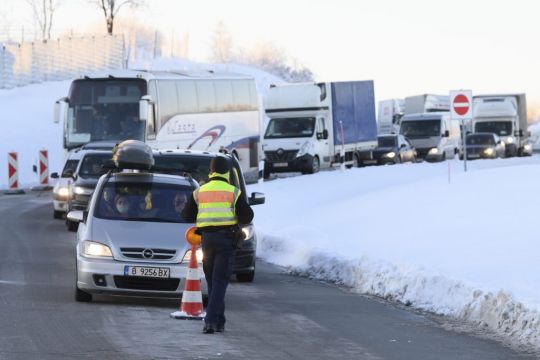Germany has implemented tighter border controls on its frontiers with the Czech Republic and Austria’s Tyrol province in an effort to stem the spread of more contagious coronavirus variants.
The new restrictions limit entry from those areas to German citizens and residents, lorry drivers, transport and health service staff and a few others, who have to register online and show a negative coronavirus test.
Interior minister Horst Seehofer said the new checks may cause some delays at the border and German police “will not just wave traffic through”.
Infection rates in Germany have been declining steadily in recent weeks but officials are concerned about the possible impact of variants first discovered in Britain and South Africa. Both variants have been reported in Germany but so far appear to account for just a small proportion of cases.
Significant numbers of cases of the latter have been discovered in Tyrol, whose residents have needed to show a recent negative coronavirus test to travel to the rest of Austria since Friday. The spread of the British variant has prompted a complete lockdown of some Czech districts on the border with Germany and Poland.

Bavarian governor Markus Soeder, speaking at Schirnding on the Czech border, said that “not taking the (virus) mutations seriously would mean significant consequences”.
Mr Soeder, whose state contains half the German-Czech border and the entire German-Austrian border, noted that districts on the Czech border have particularly high infection rates.
“On top of that comes concern at the moment with our Czech partners that it is unclear what will happen with their corona management,” Mr Soeder said, pointing to the Czech parliament’s refusal to extend a state of emergency. “We are friends, we help; we gladly take in Czech patients if that’s wanted, but of course if there were to be no measures at all across the border, that means a significant danger.”
On Sunday morning, federal police said that 288 of the 717 people checked at the Bavarian-Czech border were turned back because they were not entitled to cross, along with 247 of more than 1,000 checked at the border with Tyrol.
Chancellor Angela Merkel and Germany’s 16 state governors agreed on Wednesday to extend most of the country’s lockdown restrictions until March 7, though schools and hairdressers can open sooner.
They set a new target of 35 new cases per 100,000 inhabitants per week before letting small stores, museums and other businesses reopen. That figure stood at 57.4 on Sunday, down from a peak of nearly 200 just before Christmas.
The eastern state of Saxony’s governor cautioned Germans against expecting too much too soon.
“Unfortunately, there can’t be Easter vacations in Germany this year,” Michael Kretschmer said. “Too much mobility as a result of travel and tourism already in April would be poison. We would destroy everything we have achieved since mid-December.”
Hotels and restaurants in Saxony, which was hard hit in the autumn and winter, will have to remain shut over Easter, and the reopening of theatres and operas will have to wait until after Easter, he said.







